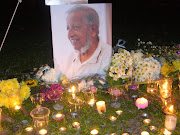Singapore: End Efforts to Silence Opposition
Defamation Suits Put Party at Risk of Bankruptcy
(New York, October 17, 2008) – Singapore’s leaders should end the practice of using defamation suits to stifle political opposition, Human Rights Watch said today.
“Using defamation laws to silence peaceful political speech makes a mockery of Singapore’s claim to be a model democracy,” said Elaine Pearson, deputy Asia director at Human Rights Watch. “Opposition criticism of the government is an essential ingredient of a democratic political system.”
Human Rights Watch urged the Singaporean government to lift legal restrictions on freedom of expression to bring the country in line with international law.
On October 13, 2008, in Singapore’s latest defamation ruling, the High Court ordered the Singapore Democratic Party (SDP), its secretary general, Dr. Chee Soon Juan, and his sister, Chee Siok Chin, to pay Prime Minister Lee Hsien Loong and his father, Minister Mentor Lee Kuan Yew, a total of SD$610,000 (US$416,000). The suit stemmed from an article in the party’s newsletter comparing the way Singapore is governed to a scandal at a well-known charity. Six other defendants, all SDP central executive committee members, had previously issued an apology and paid a total of SD$340,000 (US$233,000) to the plaintiffs.
The ruling threatens to compel the SDP to declare bankruptcy and shut down.
The People’s Action Party has been in power since self-governance began in Singapore in 1959. In the last election in May 2006, it won 82 out of 84 parliamentary seats. The SDP has not won any seats in Parliament since 1991, when it captured three seats in its biggest election win.
Dr. Chee and Ms. Chee are not the first opposition leaders to be driven into bankruptcy by defamation suits. In 2001, J.B. Jeyaretnam, the first opposition member of Parliament, who died on September 30, 2008, was made bankrupt through damages awarded to the two Lees and former Prime Minister Goh Chok Tong. Bankrupt Singaporean citizens are prohibited from running for office and may not travel abroad without permission from the government’s Insolvency and Public Trustee’s Office.
In July 2008, the government refused to permit Ms. Chee to take part in a democracy leadership program at Stanford University in the United States. Dr. Chee’s travel applications have been repeatedly rejected.
The assault on free speech by Singapore’s leaders extends to critical foreign publications circulating in Singapore – whether newspapers, magazines or websites. In September 2008, the Lees won a defamation suit against the Far Eastern Economic Review and its editor, Hugo Restall, for comments on the SDP case. Damages are yet to be assessed. In a further action, the government is seeking contempt proceedings against the publisher and two editors of the Asian Wall Street Journal for editorial comments related to the same case.
In October 2007, the Financial Times publicly admitted it erred in its allegations that “nepotistic motives” were involved in the appointment of Lee Hsien Loong as prime minister in 2004 and the appointment of his wife, Ho Ching, as chief executive officer of Temasek Holdings, the state investment vehicle, in 2002. The Financial Times agreed to pay costs and damages. It is unclear whether the newspaper settled because the article was in error or because it wished to avoid being banned from distribution in Singapore.
In 2002, Bloomberg News settled out of court a defamation suit brought by the Lees and Prime Minister Goh. Bloomberg paid SD$595,000 ($US338,000) over “nepotism” charges similar to those for which the Financial Times apologized. In 1995, Lee Kuan Yew and two others collected US$675,000 in damages from the International Herald Tribune over the nepotism story. Then Prime Minister Lee Kuan Yew also collected US$210,000 from the International Herald Tribune for an October 1994 article stating that “some East Asia governments relied on a ‘compliant’ judiciary to bankrupt opposition politicians.”
“The history of defamation in Singapore shows a pattern of making people pay dearly for exercising the basic right of peaceful expression,” said Pearson. “Singapore has nothing to fear from a vocal opposition and its people have everything to gain.”
Last post here
16 years ago














No comments:
Post a Comment